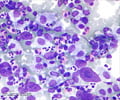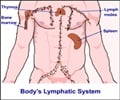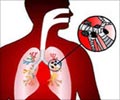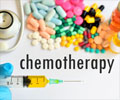- Chemotherapy to Treat Cancer - (https://www.cancer.gov/about-cancer/treatment/types/chemotherapy)
- Combination therapy in combating cancer - (https://pubmed.ncbi.nlm.nih.gov/28410237/)
- Prevention and treatment of cancer with aspirin: where do we stand? - (https://www.ncbi.nlm.nih.gov/pmc/articles/PMC4099965/)
- Cytotoxic drugs and the CD95 pathway - (https://pubmed.ncbi.nlm.nih.gov/10557062/)
- Chemotherapeutics in the treatment of multiple sclerosis - (https://www.ncbi.nlm.nih.gov/pmc/articles/PMC3002664/)
- Cancer Chemotherapy - (https://www.ncbi.nlm.nih.gov/books/NBK564367/)
- Paul Ehrlich (1854-1915): founder of chemotherapy and pioneer of haematology, immunology and oncology - (https://pubmed.ncbi.nlm.nih.gov/17415859/)
- Hazards of chemical weapons release during war: new perspectives - (https://pubmed.ncbi.nlm.nih.gov/10585902/)
- Metastasis - (https://www.cancer.gov/publications/dictionaries/cancer-terms/def/metastasis)
- Toxicological testing of cytotoxic drugs (review) - (https://pubmed.ncbi.nlm.nih.gov/11605004/)
- Apoptosis: A Target for Anticancer Therapy - (https://www.ncbi.nlm.nih.gov/pmc/articles/PMC5855670/)
- Acute lymphoblastic leukemia in adults: encouraging developments on the way to higher cure rates - (https://www.ncbi.nlm.nih.gov/pmc/articles/PMC5681222/)
- Chemoradiotherapy in Cancer Treatment: Rationale and Clinical Applications - (https://pubmed.ncbi.nlm.nih.gov/33419794/)
- Neoadjuvant therapy in cancer treatment - (https://pubmed.ncbi.nlm.nih.gov/8242583/)
- Adjuvant Therapy - (https://www.cancer.net/adjuvant-therapy)
- Palliative chemotherapy: oxymoron or misunderstanding? - (https://www.ncbi.nlm.nih.gov/pmc/articles/PMC4802642/)
- ABVD regimen - (https://www.cancer.gov/publications/dictionaries/cancer-terms/def/abvd-regimen)
- Folfox - (https://www.cancer.gov/publications/dictionaries/cancer-terms/def/folfox)
- Folfiri - (https://www.cancer.gov/publications/dictionaries/cancer-terms/def/folfiri)
- Folfirinox Regimen - (https://www.cancer.gov/publications/dictionaries/cancer-terms/def/folfirinox-regimen)
- Isolated Limb Perfusion for Malignant Melanoma: Systematic Review on Effectiveness and Safety - (https://www.ncbi.nlm.nih.gov/pmc/articles/PMC3227960/)
- Controlled drug delivery vehicles for cancer treatment and their performance - (https://www.ncbi.nlm.nih.gov/pmc/articles/PMC5854578/)
- Nanoparticle Albumin Bound Paclitaxel in the Treatment of Human Cancer: Nanodelivery Reaches Prime-Time? - (https://www.ncbi.nlm.nih.gov/pmc/articles/PMC3659516/)
- Bacteria-derived minicells for cancer therapy - (https://pubmed.ncbi.nlm.nih.gov/32721550/)
- Promoting a Healthy Lifestyle among Cancer Survivors - (https://www.ncbi.nlm.nih.gov/pmc/articles/PMC2383876/)
- Sexual Functioning Along the Cancer Continuum: Focus Group Results from the Patient-Reported Outcomes Measurement Information System (PROMISâ„¢) - (https://www.ncbi.nlm.nih.gov/pmc/articles/PMC3013236/)
- Cancer Treatment-Related Infertility: A Critical Review of the Evidence - (https://www.ncbi.nlm.nih.gov/pmc/articles/PMC6649805/)
- Fertility Issues in Boys and Men with Cancer - (https://www.cancer.gov/about-cancer/treatment/side-effects/fertility-men)
- The Most Common Side Effects Experienced by Patients Were Receiving First Cycle of Chemotherapy - (https://www.ncbi.nlm.nih.gov/pmc/articles/PMC6123577/)
- Informed Consent and Chemotherapy - (https://www.ncbi.nlm.nih.gov/pmc/articles/PMC2794404/)
- After chemotherapy - discharge - (https://medlineplus.gov/ency/patientinstructions/000012.htm)
About Chemotherapy
Chemotherapy, also called 'chemo' is one of the cancer treatments that uses one or more cytotoxic drugs to kill cancer cells in our body.(1✔ ✔Trusted Source
Chemotherapy to Treat Cancer
Go to source) However, these drugs are unable to differentiate between normal cells and cancer cells and they destroy the former too in their war against
cancer. This leads to certain side effects.
Chemotherapy is used in over half the patients who are treated with cancer. It is used to treat not only the cancer cells in an organ but also distant sites to which the tumor or cancer might have spread. Hence, chemotherapy is a systemic therapy, meaning, it treats the body as a whole.
When chemotherapy was first put into practice, there were many side effects, and sometimes they proved to be fatal. Now the practice is much safer with better monitoring and the use of combination therapy. An oncologist will prescribe a chemotherapeutic regimen, which is a combination of drugs used to treat cancer(2✔ ✔Trusted Source
Combination therapy in combating cancer
Go to source). Some of these drugs are administered to treat the dividing cells at various stages. The regimen may also include some supportive drugs to minimize the side effects. To get the best results, it is important to follow the regimen and the schedule.
In the earlier days, when popping an aspirin for a headache was also referred to as 'chemotherapy'(3✔ ✔Trusted Source
Prevention and treatment of cancer with aspirin: where do we stand?
Go to source), the word was used in reference to any drug or medicine employed to treat a disease. The term 'anti-bacterial chemotherapy' is used when antibiotics are employed to control a disease. In that sense, syphilis-treating arsenic compounds were the first modern chemotherapeutic agents. This was followed by other antibiotics, like sulfonamides and penicillin. In the modern sense, it primarily refers to the cytotoxic drugs used in cancer treatment.
These cytotoxic drugs completely cure cancerous conditions such as Hodgkin's lymphoma, non-Hodgkins lymphoma, certain types of leukemia, and
Cytotoxic drugs and the CD95 pathway
Go to source).
Chemotherapy agents have also found use in treating non-cancer conditions like overcoming transplant rejections and autoimmune diseases such as rheumatoid arthritis and multiple sclerosis(5✔ ✔Trusted Source
Chemotherapeutics in the treatment of multiple sclerosis
Go to source).
Before starting the chemotherapy, one needs to check the patient's performance status. Performance status is usually a score that tells the physician if the patient is fit to undergo chemotherapy or if the dose of the drugs needs to be reduced.
History of Chemotherapy
“We must search for magic bullets. We must strike the parasites, and the parasites only, if possible, and to do this, we must learn to aim with chemical substances!”
Much of the original work leading to the 'magic bullets' is credited to a German bacteriologist from Frankfurt - Paul Ehrlich(6✔ ✔Trusted Source
Cancer Chemotherapy
Go to source).
He was awarded the Nobel Prize in Physiology or Medicine in 1908 for some of his pioneering work and is considered the 'father of modern immunology and chemotherapy'(7✔ ✔Trusted Source
Paul Ehrlich (1854-1915): founder of chemotherapy and pioneer of haematology, immunology and oncology
Go to source). After Ehrlich laid down the principles, the treatment of cancer cells using chemotherapeutic agents was first carried out in the 1950s. The first drug used to treat cancer was discovered by chance. During World War II, mustard gas was used as a warfare agent(8✔ ✔Trusted Source
Hazards of chemical weapons release during war: new perspectives
Go to source). It was discovered that individuals who were accidentally exposed to mustard gas had low WBC counts. It was reasoned that an agent with such an effect on the rapidly dividing WBC could have the same effect on cancer cells too. As a result, the drug was intravenously used to treat individuals with late-stage lymphomas, with dramatic early results. Back then, the result of this treatment did not last long; nevertheless the effect it had on the patients was remarkable, and as a result, they improved considerably.
Later on, research helped to discover many more chemotherapeutic agents to treat cancer. Several drugs that have been researched and tested have entered the fray. Treatment is far more focused and effective than it has ever been, but the basic principles and limitations of the therapy still remain.
Today, it can be unquestionably said that with the help of these drugs, cancer patients are able to lead a better quality life.
Principles of Chemotherapy
Chemotherapeutic drugs act on fast-dividing cells by arresting the mitotic stages of the cell cycle.
Cancer is characterized by the transformation of normal cells through uncontrolled division and growth. These malignant cells then spread to other parts of the body by a process known as metastasis(9✔ ✔Trusted Source
Metastasis
Go to source). In the case of autoimmune disorders, the body launches an attack on itself by unleashing the WBCs. In the case of transplant rejection, the attack is directed towards the transplanted foreign organ.
It has been deduced that the chemotherapeutic drugs act on the fast - dividing cells by arresting the various mitotic stages of the cell cycle. Hence they are also called 'cytotoxic' drugs(10✔ ✔Trusted Source
Toxicological testing of cytotoxic drugs (review)
Go to source). These drugs are more effective in individuals with diseases characterized by fast-replicating cells, like Acute Myeloid Leukemia (AML) and Hodgkins Disease.
Chemotherapeutic drugs have a better impact on tumors that are 'young,' in other words, those that have a considerable population of differentiated cells. As the tumor ages, the cells lose their ability to differentiate. Such tumors become 'indifferent' to chemotherapeutic drugs. Radiation or surgery may be a better option in this situation.
Some drugs bring about a semblance of orderliness in tumor cells by promoting 'apoptosis' or 'programmed cell death', which is a function of normal cells. This function is lost when the normal cells become malignant(11✔ ✔Trusted Source
Apoptosis: A Target for Anticancer Therapy
Go to source).
Scientists are now working on drugs that target specific features of the cancer cells. Imatinib, a monoclonal antibody drug, has been successful in attacking the Philadelphia chromosome, commonly seen in patients with CML(12✔ ✔Trusted Source
Acute lymphoblastic leukemia in adults: encouraging developments on the way to higher cure rates
Go to source). Efforts are on to identify more such features in order to develop efficient treatment modalities. Intracellular efflux pumps, such as p-glycoprotein, have been identified that actively flush out drugs from inside the cells to the outside. In the year 2007, medications that promote the efficacy of chemotherapy by impairing the functioning of p-glycoprotein have been tested.
Cytotoxic drugs do not always distinguish between normal and abnormal fast-dividing cells. They enter the blood stream and have a profound effect on the healthy cells too, resulting in side effects. Examples are the hair cells and the cells that make up the intestinal lining, which are damaged during chemotherapy. However, the normal cells are able to revive due to an inherent repair mechanism, and the symptoms usually disappear once the treatment terminates. To address this issue, doctors 'mix and match' drugs in order to provide the most suitable treatment.
Types of Chemotherapy
Chemotherapy can be used in a variety of scenarios, including neoadjuvant, adjuvant, combination, and metastatic.
Neoadjuvant therapy
It is a treatment that is administered prior to the primary treatment.
Adjuvant therapy
It is a treatment that is used in addition to the primary therapy to suppress or eliminate the growth of occult cancer cells.
Combination therapy
It is a treatment modality that combines two or more therapeutic agents
The Aim of Chemotherapy
Chemotherapy is carried out to cure cancer or prevent its recurrence.
Chemotherapy can be used to cure cancer completely or before or after surgery or radiotherapy. It may be given at an advanced stage as a palliative treatment. The objectives of the treatment depend on the stage of the cancer.
- To cure cancer - In certain cancers, like acute leukemia or testicular cancer, chemotherapy can achieve a complete cure. Sometimes chemotherapy is given in combination with radiotherapy. This is known as chemo-irradiation or chemoradiotherapy.(13✔ ✔Trusted Source
Chemoradiotherapy in Cancer Treatment: Rationale and Clinical Applications
Go to source) - Prior to surgery (or) Neo-adjuvant therapy - Sometimes, when a tumor is large, there is a need to reduce its size before surgery. Chemotherapy is then employed to reduce the tumor size, and this is known as primary chemotherapy or neo-adjuvant therapy.(14✔ ✔Trusted Source
Neoadjuvant therapy in cancer treatment
Go to source) - To reduce the likelihood of recurrence following surgery (or) adjuvant therapy - Chemotherapy is sometimes carried out after surgery or radiotherapy. This is to destroy the remaining cancer cells that have escaped destruction. This treatment is called adjuvant therapy.(15✔ ✔Trusted Source
Adjuvant Therapy
Go to source) - To control cancer by reducing symptoms (or) Palliative chemotherapy - When a complete cure is not possible, as in the case of advanced cancers, chemotherapy helps to shrink the cancer and reduce the symptoms. This helps to usher in a better quality of life and increases the chances of survival. This mode of therapy is known as palliative chemotherapy.(16✔ ✔Trusted Source
Palliative chemotherapy: oxymoron or misunderstanding?
Go to source)
Types of Chemotherapy Drugs
Several types of chemotherapeutic drugs are employed to treat cancer. They function by inhibiting cell division.
Chemo drugs may be classified as follows(6✔ ✔Trusted Source
Cancer Chemotherapy
Go to source) -
- Alkylating agents
- Anti-metabolites
- Plant alkaloids and terpenoids
- Podophyllotoxin
- Taxanes
- Topoisomerase inhibitors
- Anti-tumorantibiotics (L01D)
- Monoclonal antibodies
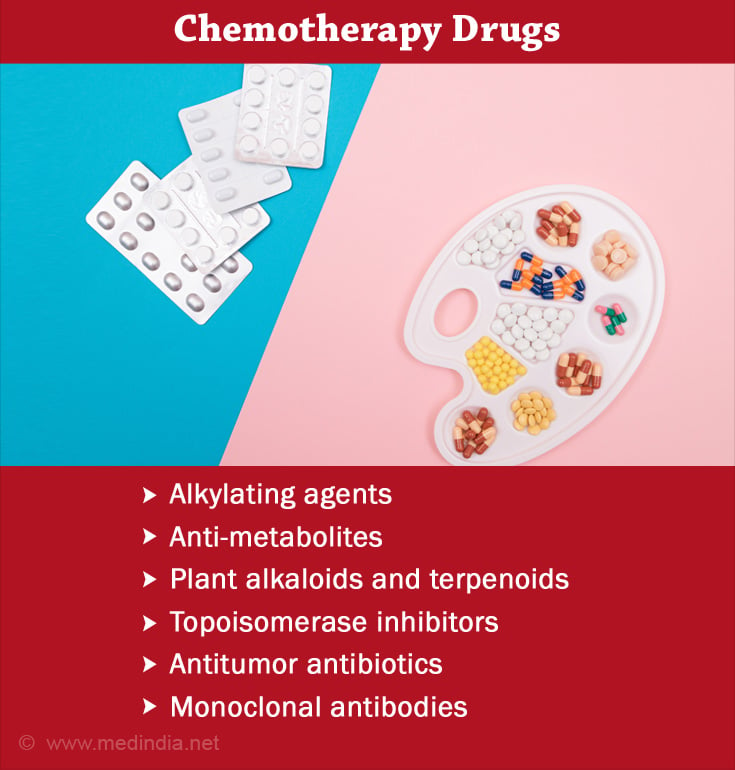
Combination therapy drugs:
ABVD - An abbreviation for a chemotherapy combination used to treat Hodgkin lymphoma. It includes the drugs- doxorubicin hydrochloride (Adriamycin), bleomycin sulfate, vinblastine sulfate, and dacarbazine, also known as ABVD(17✔ ✔Trusted Source
ABVD regimen
Go to source).
FOLFOX - An abbreviation for a combination chemotherapy regimen that is used to treat colorectal cancer. It includes the drugs leucovorin calcium (folinic acid), fluorouracil, and oxaliplatin(18✔ ✔Trusted Source
Folfox
Go to source).
FOLFIRI - An abbreviation for a chemotherapy combination used to treat advanced colorectal cancer that has spread. It is also being studied in the treatment of other types of cancer. It includes the drugs leucovorin calcium (folinic acid), fluorouracil, and irinotecan hydrochloride(19✔ ✔Trusted Source
Folfiri
Go to source).
FOLFIRINOX - An abbreviation for a chemotherapy combination used to treat pancreatic cancer that has spread to other parts of the body. It includes the drugs leucovorin calcium (folinic acid), fluorouracil, irinotecan hydrochloride, and oxaliplatin(20✔ ✔Trusted Source
Folfirinox Regimen
Go to source).
Mode of Chemotherapy Delivery
Chemotherapy drugs are delivered depending on the type of cancer and the drug used.
Chemotherapy is administered in such a way that the individual suffers the least amount of systemic damage. Depending on the type of cancer and the type of drug used, the modes of delivery may be as follows(6✔ ✔Trusted Source
Cancer Chemotherapy
Go to source) -
- Drugs in the form tablets or capsules are to be consumed orally (busulfan and capecitabine)
- Other drugs are delivered as an intramuscular injection, into the muscles of the leg or the buttocks.
- Some drugs may be injected subcutaneously, beneath the skin. Very fine needles are used for this purpose.
- In the case of intrathecal chemotherapy, the drugs are injected into the cerebrospinal fluid. This is usually done in the case of leukemias and lymphomas.
- Sometimes the drugs may be delivered into certain body cavities,such as the bladder or the pelvic cavity; this type of chemotherapy is called intracavity chemotherapy. The drugs are introduced through the tube. It may be drained out after a period of time.
- For some skin cancers, chemotherapy creams can be applied topically.
- Most chemotherapy is given It can be carried out either in an out-patient or in an in-patient set up depending upon the patient, the type and stage of cancer and the dosage of drugs
Sometimes, a combination of chemotherapy is administered, such as oral and intravenous chemotherapy.
New Methods of Drug Delivery
- Isolated Infusion Methods
In some cases of melanoma, an isolated limb perfusion may be carried out. Sometimes chemotherapy is delivered as an isolated perfusion into the liver or the lung. The main aim of this mode of treatment is to deliver a very high dose of chemotherapy to the tumors without seriously affecting the normal cells in the body. This treatment is not effective in treating metastasized cancers(21✔ ✔Trusted Source
Isolated Limb Perfusion for Malignant Melanoma: Systematic Review on Effectiveness and Safety
Go to source).
- Targeted Delivery Mechanisms
Specially targeted delivery vehicles aim to increase effective levels of chemotherapy for tumour cells while reducing effective levels for other cells. This should result in increased tumour killing and/or reduced toxicity(22✔ ✔Trusted Source
Controlled drug delivery vehicles for cancer treatment and their performance
Go to source).
Specially targeted delivery vehicles have an increased affinity for tumour cells and interact with tumour-specific antigens. This method aims to deliver the maximum effective dose to the tumor cells while reducing the toxic effect on the normal cells.
- Nanoparticles
Nanoparticles are used as vehicles for delivering drugs that are not easily soluble, like paclitaxel. One such nanoparticle, Abraxane, won the approval of the FDA in January 2005 for treating refractory breast cancer(23✔ ✔Trusted Source
Nanoparticle Albumin Bound Paclitaxel in the Treatment of Human Cancer: Nanodelivery Reaches Prime-Time?
Go to source).
- Minicells
A new method makes use of the bacteria-derived minicells that helps to selectively deliver a wide range of chemotherapy drugs to specific tumour cells, using bispecific antibodies. Cancer cells absorb the drugs through the process of endocytosis. This method is in the trial stage in humans(24✔ ✔Trusted Source
Bacteria-derived minicells for cancer therapy
Go to source).
Minicells are made up of a firm and, stable biological membrane and therefore, do not carry the risk of being destroyed. This reduces toxicity to the barest minimum.
Lifestyle Issues and Coping with Chemotherapy
There are several measures that may be adopted to make life easier during chemo(25✔ ✔Trusted Source
Promoting a Healthy Lifestyle among Cancer Survivors
Go to source)
- Maintain a positive attitude. Developing an understanding of the disease, the treatment modes,and the side effects will go a long way in helping the individual cope with cancer and chemotherapy. Accepting the situation also benefits the patient.
- Maintaining a diary is an intelligent way to comprehend the situation. It allows free expression of the individual's feelings and also helps to keep a track of the events and their developments.
- Complementary therapies, such as meditation, reduces stress and anxiety and helps withcancer treatment and its side effects of the treatment. Acupuncture and aromatherapy may also help.
- It is imperative that the patient rests whenever required. It is also important to spare some time to pursue hobbies that were once a passion.
- Joining a support group will definitely be very comforting, useful, and informative for a patient who is being treated for cancer.
- Professional counseling may help some individuals cope with cancer and its treatment.
- The patient must remember that family members are also very apprehensive about the patient's state. It will help to talk openly to them and to seek their help whenever required.
Chemotherapy and Sexual life
Some individuals who undergo chemotherapy find that their sexual lives are no longer the same. Emotions related to the treatment, such as stress and anxiety, chances of survival, finances, and thoughts about the family, are very common among those undergoing chemotherapy. These emotions can be very disturbing and are an anathema to sex.
Certain side effects, such as fatigue and tiredness, can also create disinterest in sex. It must be noted that most of the side effects tend to wear off after the treatment stops(26✔ ✔Trusted Source
Sexual Functioning Along the Cancer Continuum: Focus Group Results from the Patient-Reported Outcomes Measurement Information System (PROMISâ„¢)
Go to source).
Cancer is not contagious, and undergoing chemotherapy should not prevent an individual from having or enjoying sexual activity. The drugs do not interfere with an individual's ability to indulge in sex. Some doctors believe that the drugs have an effect on the vaginal and seminal fluids. They advise their patients to use contraception for a few days after chemotherapy to protect their partner.
Cancer cannot be passed on to one's partner during sexual activity, and neither the drugs worsen the cancer. Talking to a health expert and also to one's partner will help to improve the situation.
Chemo and Fertility
Chemotherapy treatments may increase the risk of infertility in both men and women.
Infertility might shatter the self-esteem of an individual and prove to be very depressing. It is therefore essential to air all doubts with the doctor and include one's partner in the discussion.
Females
Chemotherapy treatments may increase the risk of infertility by bringing about menopause. In some cases, the problem may be reversed once the drugs stop. Hormone Replacement Therapy (HRT) may be given for some individuals with menopausal syndromes. This issue must be raised by the individual with the doctor and also with the partner.
In cases of pregnancy, chemotherapeutic drugs may harm the baby Therefore, effective contraceptive measures, such as condoms, must be adopted.
If a woman is pregnant during chemotherapy, it is important to discuss it with the doctor. Termination of pregnancy may be advisable. In some cases, chemotherapy is given during the later stages of pregnancy, while in others, it is postponed until after the birth of the child(27✔ ✔Trusted Source
Cancer Treatment-Related Infertility: A Critical Review of the Evidence
Go to source).
Male
Some chemotherapy drugs may reduce the sperm count while other drugs affect sperm motility(28✔ ✔Trusted Source
Fertility Issues in Boys and Men with Cancer
Go to source). This will affect an individual's ability to father a child, temporarily or permanently. This will however have no effect on the individual's ability to enjoy sex. If an individual is yet to father a child, his sperms may be cryo preserved or frozen in a laboratory for later use.
Testicular tumors affect men in the prime of their youth. Counseling before starting treatment should include discussion about sperm preservation.
Chemotherapy - Pros and Cons
The benefits of chemotherapy depends on the type and stage of cancer and also on the affected individual.
- In early-stage cancer, surgery is performed with the intention of curing the disease. This is often followed by chemotherapy to reduce the risk of recurrence.
- In the case of advanced-stage cancer, the aim of treatment is to control the cancer by controlling the symptoms. This enhances survival and ensures a better quality of life.
There are disadvantages as well -
- Chemotherapy causes a number of side effects that can be extremely uncomfortable for the patient.This may be discussed with the doctor. There are several medications available that control these symptoms(29✔ ✔Trusted Source
The Most Common Side Effects Experienced by Patients Were Receiving First Cycle of Chemotherapy
Go to source). - Some people may not benefit from the treatment but will not be spared the side-effects. Palliative care is usually given to such people.
- The patient may be required to travel to a distant place to get treated.
- Although the majority of the chemotherapy drugs can be administered to an individual as a day patient at the hospital, some treatments will require
- The treatment may not improve the overall prognosis of the cancer and may not necessarily increase the life span of a person.
- Sometimes the quality of life degradeswhen on palliative chemotherapy, and if it is unlikely to improve the life span, one needs to ask if it is worth taking the treatment.
- Some chemotherapy regimenscan lead to death in a small group of patients, and one needs to understand these grave consequences before starting the treatment.
Side effects of Chemo
Chemotherapy can result in:
- Fatigue
- Lack of appetite List of Drugs that may cause Loss Of Appetite (Anorexia)
- Nausea
- Bowel difficulties such as constipation or diarrhoea
- Hair loss
- Mouth sores
- Skin and nail problems
You can have difficulty concentrating or remembering things. There may also be nerve and muscular symptoms as well as alterations in hearing. You will be more susceptible to infections.
Chemotherapy can have long-term effects on the body. Some of these changes may occur months or years after the treatment is completed. Early menopause, infertility, changes in feeling in your hands and feet (peripheral neuropathy), and heart and lung problems are all possible late side effects.
Consent for Chemotherapy
Chemotherapy will be administered only with the patient's permission. Before undergoing chemotherapy, the details of the treatment will be explained to the patient who will then be asked to sign a consent form. This denotes the permission given by the patient to be treated through chemotherapy. Before signing the form, the patient should be informed about the following(30✔ ✔Trusted Source
Informed Consent and Chemotherapy
Go to source):
- Nature and duration of the treatment
- Advantages and disadvantages of the treatment
- Benefits of the treatment
- Risks involved
- Possibilities of other treatments
The treatment will begin only after getting consent. Chemotherapy is often complex, so repeated explanations might be required. A list of questions about your condition, the treatment plan, its duration, and any side effects and how one can cope with them should be prepared before seeing the doctor or nurse. Taking along a friend or a relative may be useful for the patient.
Alternatively, the patient might decide not to have the treatment. This decision needs to be conveyed to the doctor, who will then explain the outcomes of not taking the treatment. The patient's decision is then recorded in the medical charts.
Care that should be taken during or after chemotherapy
Infection, bleeding, and skin concerns are all possibilities. You must take care of yourself to stay healthy after chemotherapy. This includes, among other things, practising oral hygiene and preventing infections(31✔ ✔Trusted Source
After chemotherapy - discharge
Go to source).
- Understand how to cook and store foods safely.
- When eating out, be cautious. Consume no raw vegetables, meat, seafood, or anything else you are unsure about.
- Wash your hands frequently with soap and water, including after being outside.
- After coming into contact with bodily secretions such as mucus or blood.
- Keep your house tidy. Keep clear of large crowds. Visitors with a cold should wear a mask or refrain from visiting. perform, not do yard work or deal with flowers or plants.
- Be cautious with pets and animals.
- Keep your cat inside if you have one.
- Have someone else change your cat's litter box on a daily basis.
- Don't roughhouse with cats. Infections can occur from scratches and bites.
- Keep puppies, kittens, and other young animals away from you.
- Other things you may do to be healthy include knowing how to care for a central venous line or PICC (peripherally implanted central catheter) line.
- If your platelet count remains low, learn ways to prevent bleeding during cancer treatment from your doctor.
- Walk to stay active. Gradually increase your distance based on your energy level.
- Consume enough protein and calories to maintain your weight.
- Inquire with your provider about liquid food supplements that can assist you in getting enough calories and nutrients.
- Be cautious when out in the sun. Wear a wide-brimmed hat. Apply sunscreen with an SPF of 30 or higher to any exposed skin.
- Don't smoke.
Mouth Care
Maintaining good oral hygiene is important as chemotherapy might result in dry mouth or mouth sores. This can increase the amount of bacteria in your mouth. Bacteria in your mouth can cause illness, which can spread to other parts of your body.
- Brush your teeth and gums two to three times per day for two to three minutes each time. Brush your teeth with a toothbrush with gentle bristles.
- Allow your toothbrush to air dry between brushes.
- Use fluoride-containing toothpaste.
- Once a day, carefully floss your teeth.
- Avoid eating or drinking anything that is undercooked or rotten
- Check the safety of your water.



